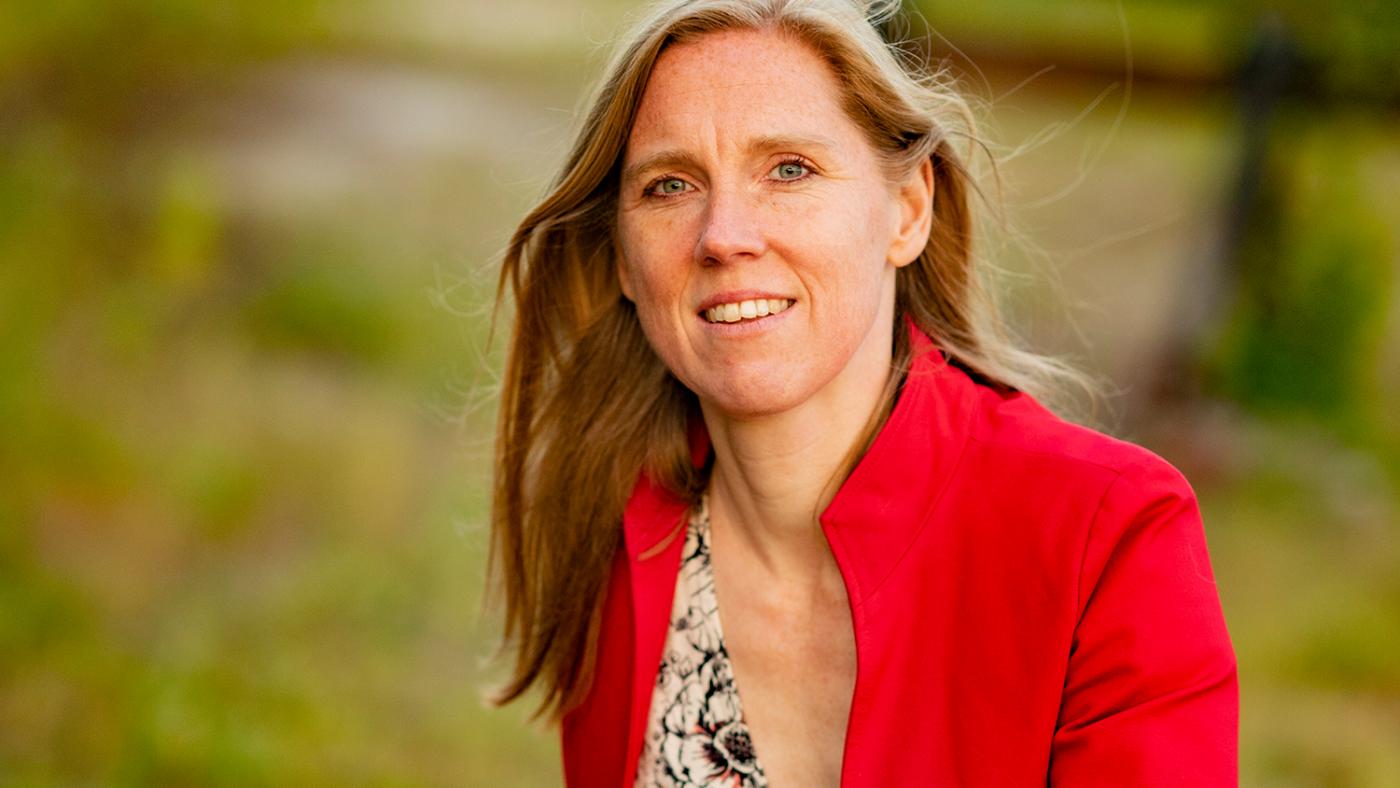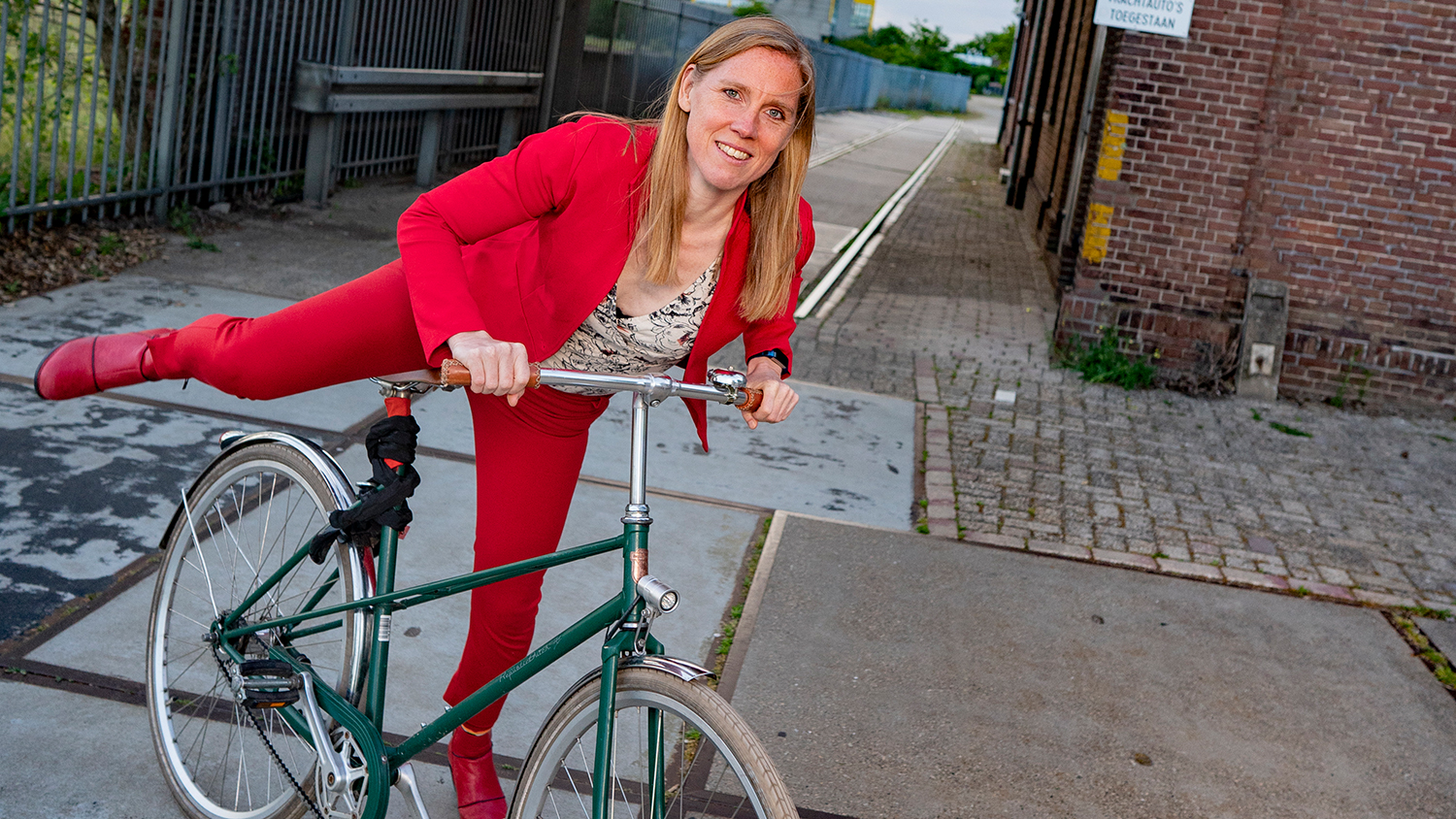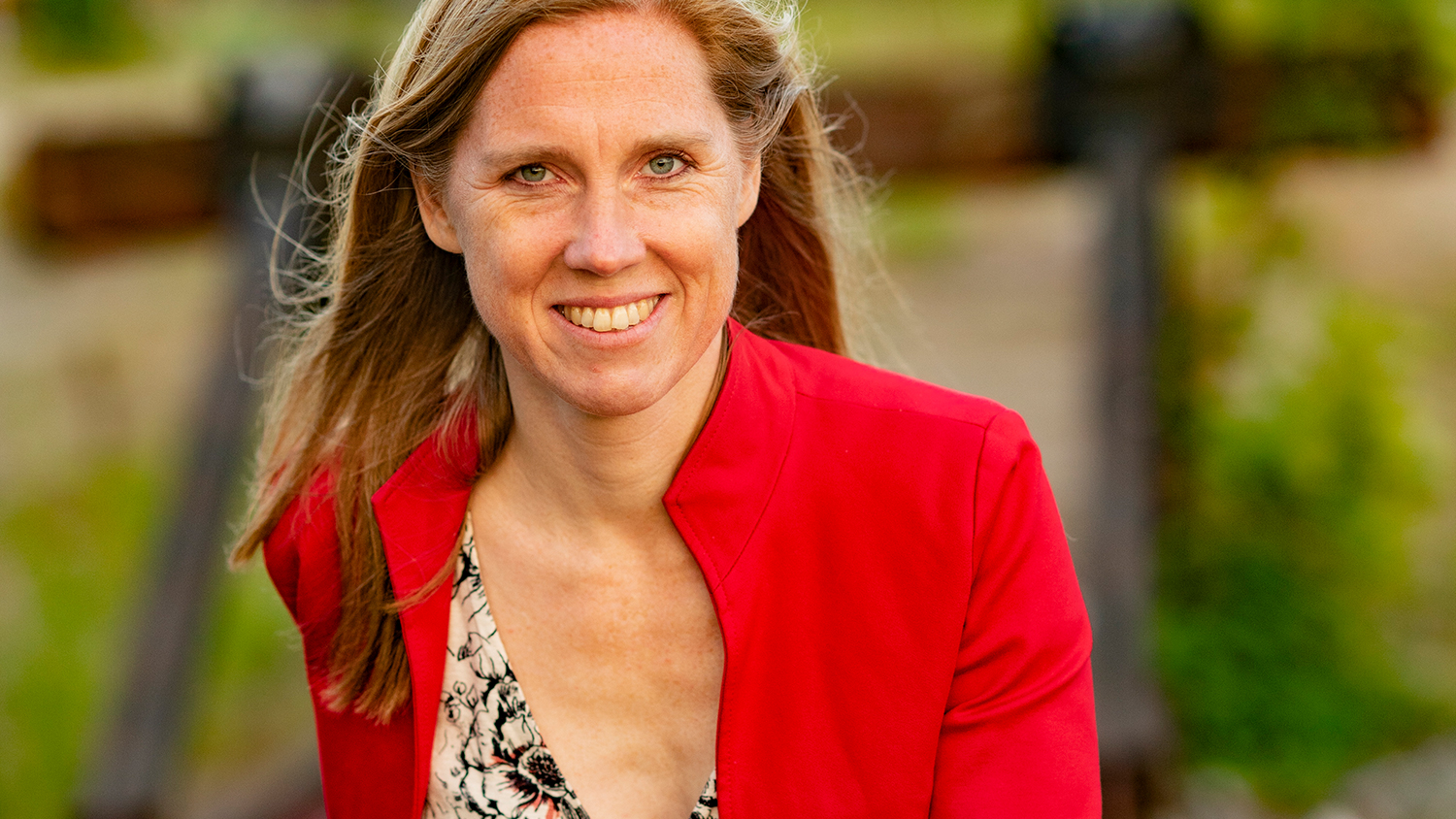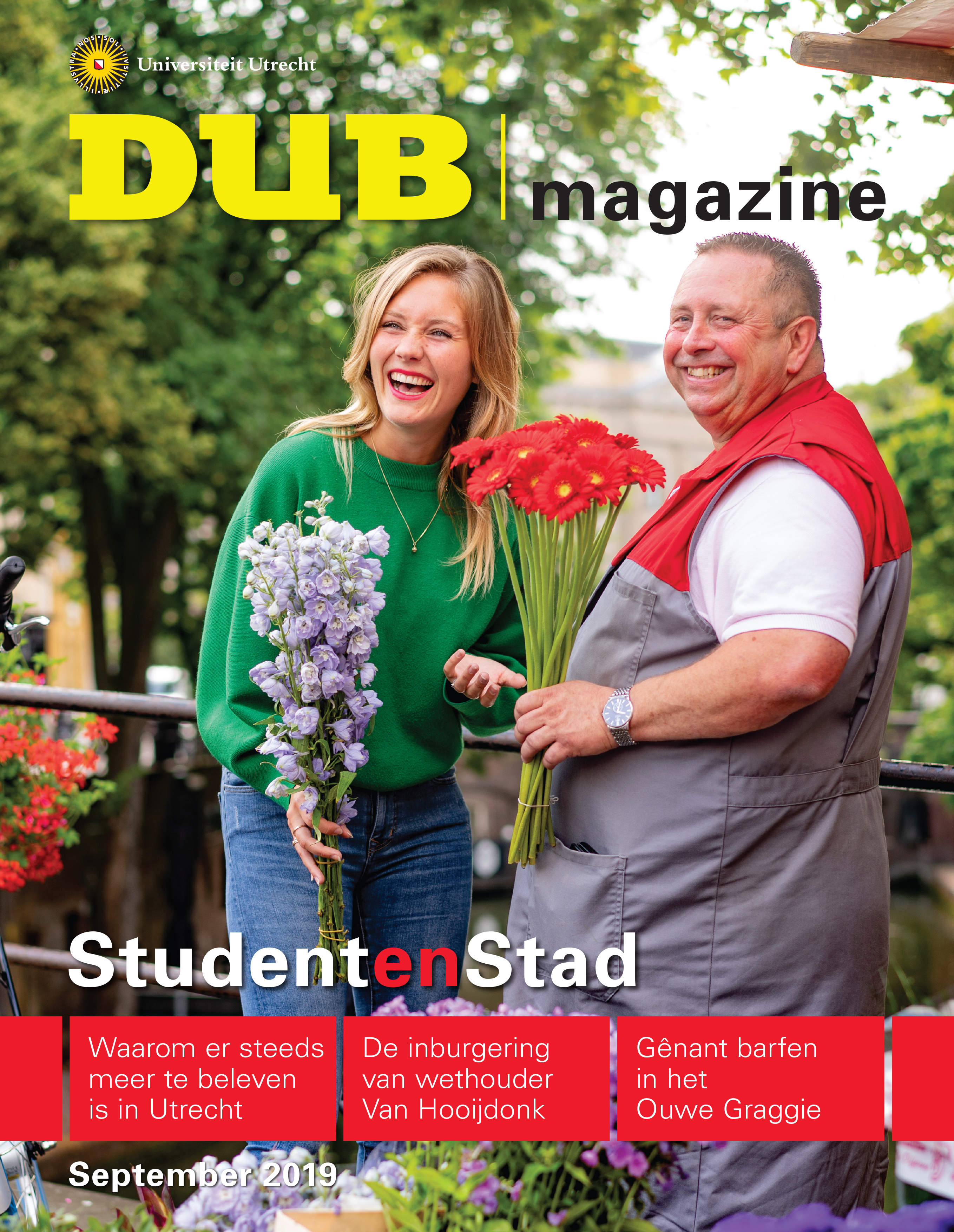Alderwoman Lot van Hooijdonk: ‘They tell me I’ve become such a Utrechter’

In Utrecht city politics, Lot van Hooijdonk (41) is probably the most well-known alder(wo)man. Bicycle traffic, the Uithoflijn tram, sun and wind energy, making homes energy-efficient; they’re all in her portfolio. She was named best young administrator of the Netherlands twice, and in the most recent city council elections, she received the highest number of preference votes out of every candidate. But with her outspoken ideas, she also elicits strong reactions. On social media, she’s less popular. She’s said to be rigid, and people claim she doesn’t listen to the city’s residents. In debates about the far too expensive Uithoflijn tram, she survived a vote of no confidence against her.
Lot van Hooijdonk works on the twentieth floor of the city hall, with a view of the entire city. “It’s gorgeous here,” she smiles. Once, she’d been an awkward student, now she’s an alderwoman for everyone in Utrecht. How did she get there? When did she start feeling like an Utrechter? And to what extent does her experience as a student help her in the decisions she makes as city administrator?
“I grew up in Tilburg, and after secondary school, I had no clue what I wanted to study, or where. The only thing I was certain of: I was going to leave home, and go to a big city. But Amsterdam or Utrecht? To me, both were one and the same. In any case, it had to be bigger than Tilburg.”
Van Hooijdonk chose to enrol in the History programme. “I had no idea what programme I wanted to do. The courses I’d taken in secondary school were in the sciences field, and I loved that. I just put down history as a temporary option because I wanted to understand how the world works. I thought perhaps that programme could help me do that. I chose Utrecht after visiting the open day. They told me that if you studied history, you shouldn’t expect a clear, linear career path. There were also graduates who ended up working at the Schiphol airport conveyer belts. I thought that was such a disarmingly honest answer.”
Her grandfather was a factory worker, her father climbed up from MULO (vocational education) and night school to become an English teacher. Her mother didn’t finish her higher education due to a lengthy illness from tuberculosis, and then worked in her family’s grocery store. “I was raised with the idea that the elite is something we’re not a part of,” Van Hooijdonk says. For that reason, when she came to Utrecht for the Utrecht Introduction Days, she didn’t sign up for one of the traditional student associations. Some time later, she did become an active member of the history programme’s study association, UHSK.
What were your first impressions of Utrecht?
“For the first six months, I still lived in Tilburg. I played volleyball at a reasonable level. Then I was able to get a room in Hoograven thanks to a classmate. A Greek-Dutch family had inherited a home, and let their grandson who studied in Utrecht live in it. It had room for two more students. The Greek guy studied mechanical engineering, and the other girl studied at the art academy. We cooked together sometimes, but not all that often. When the parents came over from Greece, they stayed in the house as well.”
“I didn’t really think about the fact that I lived in Utrecht, I was more of a ‘user’. I took bus 6 to the city centre, visited friends at the IBB, and regularly went out to the Ekko, Tivoli, or to the movies. Het Oude Pothuys was our favourite pub. And we went to the study association parties in the K-Sjot.
“After a year, I joined a volleyball club. Not the students’ club, but a regular one, because they played at a higher level. I saw all types of sports halls: the OSG schools in Kanaleneiland, the one at the Jaarbeurs, and at Galgenwaard stadium. That was how I got to know the city.”
A classmate remembers you as an ambitious student who was interested in international relations, but not as someone who wanted an academic career. You were mostly interested in organising study trips.
“My doubts about what to do with my life didn’t go away once I started my studies. A scientific career wasn’t for me. But in History, you do learn to analyse events, understand complex terms, and to explain well what you mean. It sharpens you.”
You only became active in politics at the end of your studies. How did that go?
“It was an emotional time, Pim Fortuyn was gaining popularity. People’s gut feelings could get nasty so fast that it scared me. Where is this society going, I wondered? That fear was a reason I tried to find a political party that fit with my ideas. I chose GroenLinks, because they don’t just do whatever the people shouting the loudest say, but they dare to swim against the current. With people who keep thinking, and searching for nuance.”
You started in work groups of the national party, but quickly transferred to city politics. Why?
“Nationally, it’s harder to see instant effects of your volunteer work; locally, I felt more useful. As a board member, I was in charge of a campaign for the municipal elections, an election programme, good candidates for aldermen positions, and a list of council candidates. That was how I discovered how much I liked administration. I wasn’t as involved yet with the local topics at the time. I knew more about how the European constitution referendum worked than what was happening in the city.”
After your studies, you worked at the ministry of Infrastructure and Water Management, as policy officer and copy editor, but you still lived in Utrecht. Did that strengthen your connection to the city?
“I think so. I was active in the street committee of the Tweede Daalsebuurt neighbourhood, among other things. But when I was asked to become alderwoman in 2014, it felt like a giant leap forward for me. Suddenly, I had the opportunity to contribute to the future of the city.”

What is your mission as alderwoman? You’re seen as a rational administrator, someone who sees a long-term goal and consistently works to attain it. You’re unwavering in it, but sometimes seem less than flexible, we’ve heard from other city politicians.
“It’s true that I care more about the contents than about the game of politics. But when I have a plan, I do think about the best way to communicate it. I can only execute a plan when the people in the city and the city council support it.”
Fierce, she continues: “Of course, there will be people who object. Change isn’t always easy. But many people support our approach in topics like mobility or energy. Moreover, people often have conflicting interests. Take the ambition our bench has to create a liveable, accessible city. As a commuter, you want to travel from A to B as fast as possible, and perhaps park your car right in front of the door, but as a resident, you want a safe, green playground for your children, with as little traffic as possible. It’s up to the municipality to find balance in this.”
Sometimes, it’s playing hardball, like in the debate about the Uithoflijn tram in which you were accused of not having sufficiently informed the city council.
“Debates like that are painful and frustrating. And it wasn’t about the content, it was about the process. You know that’s how it works. It’s unpleasant, but thankfully I do manage to let a debate like that go after a while.”
Are you a completely naturalised Utrechter now?
“I know the city well by now. I will never lose my southern accent, and when I’m down south in Brabant, I soak up the scents of my youth. But I do know that I’ve become more and more Utrechter without my noticing. I remember, for instance, that in my early days here, I felt the culture in Utrecht was rather harsh sometimes. When I’m Brabant now, people accuse me of being too blunt myself.”
Does it help for your work as alderwoman that you went to university here?
“I realise what it’s like to be new in town. And there are things I bring with me from my own college days. People’s behaviour on bicycles, for instance. I know that when you’re a student, you tend to have a casual approach to following traffic regulations. That’s simply a reality that you can’t just change like that. Things like that are good to know when you’re creating policies.”
 CV Lot van Hooijdonk: 1978: Born in Tilburg / 1996-2002: History student at Utrecht University / 1999: Political Science at University of Florida / 2002-2003: Postdoctorale Leergang Instituut Clingendael / 2003-2005: Speechwriter en press officer Ministry of Transport, Public Works and Watermanagement / 2005-2010: Senior-advisor Ministry of Transport, Public Works and Watermanagement / 2010-2014: Adjunct-director Natuur- en Milieufederatie (Federation of Nature and Environment)/ 2014- : Alderwoman in Utrecht
CV Lot van Hooijdonk: 1978: Born in Tilburg / 1996-2002: History student at Utrecht University / 1999: Political Science at University of Florida / 2002-2003: Postdoctorale Leergang Instituut Clingendael / 2003-2005: Speechwriter en press officer Ministry of Transport, Public Works and Watermanagement / 2005-2010: Senior-advisor Ministry of Transport, Public Works and Watermanagement / 2010-2014: Adjunct-director Natuur- en Milieufederatie (Federation of Nature and Environment)/ 2014- : Alderwoman in Utrecht